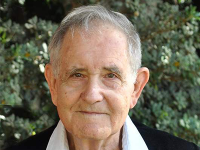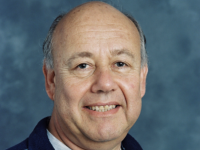-
Prof. Givol David
1929 - 2012
He devoted his career at Weizmann to investigating the tumor suppressor gene p53, the most frequently mutated gene in all cancers, and focused on mechanisms that activate p53 and the way p53 activates target genes, using microarrays. He also studied the effect of p53 on different chemotherapies and the connection between stem cells and cancer, exploring the properties of "cancer stem cells" that are responsible for the propagation of malignant tumors. He isolated such stem cells from leukemia and glioblastoma and compares gene expression profiles of stem and non-stem tumor cells and test differential drug response in these cells.
Prof. Givol passed away on 22/12/2012, and is greatly missed. -
Prof. Abraham Amsterdam
1940 - 2021
Prof. Avraham Amsterdam, known to his friends and colleagues as Avrumi, passed away on 1.1.2021, at the age of 81 years.
Avrumi was born in Haifa. Already as a young child he excelled in music and particularly in playing the piano, and for a number of years he deliberated whether to continue on the track of becoming a professional musician. However, he eventually decided to become a scientist, leaving music as a hobby.
After completing his PhD at the Hebrew University in Jerusalem in 1971, Avrumi went to New York for a post-doc at the Rockefeller University. There, he worked with Prof. James Jamieson and Prof. George Palade, who has been described as "the most influential cell biologist ever", and who in 1974 was awarded the Nobel Prize in Physiology and Medicine. Palade was particularly known for the innovative use of electron microscopy in cell biology. Avrumi was able to acquire great expertise in this methodology and applied it extensively in the course of his career as an independent researcher.
Avrumi started his lab at the Weizmann Institute at the end of 1973. While he worked initially on acetylcholine receptors, he rapidly turned his interest to the ovary and particularly to ovarian granulosa cells, an area in which he became a world leader. Among his many achievements, he was the first to establish immortalized granulosa cell lines that retained their differentiated features and have become a key tool in the study of this important class of ovarian cells.
Even after he formally retired and became a professor emeritus, Avrumi continued his research with great passion and dedication, taking his microscopy expertise to a new area: identification of distinct populations of putative cancer-initiating cells in sections from tumors of ovarian cancer and pancreatic cancer.
In parallel with his rich scientific career, Avrumi continued to cultivate his love for music, mainly through voluntary performances to audiences of hospitalized sick children and residents of old people’s homes. Volunteering was always important to him, and he did it with passion that was second only to his passion for science.
During the last years of his life, Avrumi’s health deteriorated seriously. Nevertheless, almost until his last months, he remained enthusiastic about science and cultivated hopes for writing an influential review that would challenge the dogma and introduce new approaches to cancer diagnosis.
His departure is a great loss to his family and friends, to the members of the Department of Molecular Cell Biology and to the scientific community.
-
Prof. David Yaffe
1929 - 2020
Prof. David Yaffe started his independent career as a researcher at the Weizmann Institute of Science in 1961 , his focus was on the differentiation mechanisms of muscle cells. David quickly became one of the leading scientists in the muscle researchers’ community, especially because of the knowledge he obtained and developed in growing undifferentiated muscle cells (myoblasts), in rat muscle culture, and then mouse muscle culture.
David developed the first model of mammalian cellular differentiation which has permitted many dramatic quantum-jump and paradigm-shift discoveries
The cell line that David and his colleagues developed (C2 cells), that had myogenic capabilities, became the classic research model in the field of muscle cells differentiation (myogenesis) to this day, and contributed to the discovery of molecules involved in this process. David showed that the myoblasts go through a classification process which is irreversible, during which they fuse together, to make muscle fibers.
David, as will attest many of the researchers in the field, has become one of the forefathers of the modern myogenesis field, which held many interfacing characteristics with the field of stem cells, which have many biomedical implications. David also organized a series of conventions in Israel, which turned into EMBO conventions of the developing muscle field, that most of the senior ‘muscle community’ remembers and cherished to this day.
On top of his esteemed scientific work, David was a pioneer, a humble, straight, and generous person, always passionate and inquisitive. His modesty and his love of the kibbutz life and his family, David also loved nature and plants very much, and especially strawberry and fig trees, which he nurtured in his garden at the kibbutz.
He leaves a lasting legacy that flows from his specific science contributions and also from his force of personality.
-
Prof. Uri Nudel
1940 - 2020
Prof. Uri Nudel was born in 1940 in Tel Aviv and grew up in Ramat Hasharon. He studied for his bachelor's and master's degrees in biology at Tel Aviv University and then went on to study for his Ph.D. in the laboratory of Prof. Michel Revel at the Weizmann Institute of Science. In 1975, he went on to study for postdoctoral studies at the Institute for Cancer Research at Columbia University in New York, where he studied thalassemia and specialized in innovative methods in molecular biology. In 1978 he began his career as a researcher at the Institute, focusing on the differentiation mechanisms of muscle cells, together with Prof. David Yaffe.
The extensive knowledge he acquired in New York made it possible to use the innovative methods to advance the study of muscle cells. His work has particularly advanced the research on the Duchenne Muscular Dystrophy gene and led to breakthroughs in the understanding of the gene structure and various products. One of these discoveries led to the development of a method for prenatal diagnosis of the disease.
As a person and as a supervisor, Uri was bright, honest, humble, and multi-talented. Calmly and pleasantly, he guided the many students who had been in his lab over the years with patience and good spirit. He allowed independent work out of a constant willingness to advise and help, was attentive to everyone and was interested in the lives of those around him with great empathy.
In addition to his esteemed scientific work, Uri loved sports and he regularly played tennis and ping-pong. He is greatly missed by all students, colleagues, and friends.
-
Prof. Gad Yagil
1929 - 2009
Prof. Gad Yagil was a physical chemist interested in biology, who combined theory and experimental work. He developed the theoretical concepts underlying enzyme induction and repression and explored the relation between DNA sequences and their unwinding properties. He also applied tools from information theory to analyze the complexity of DNA sequences and other biological systems. He was a kind and collegial scientist who is greatly missed.
